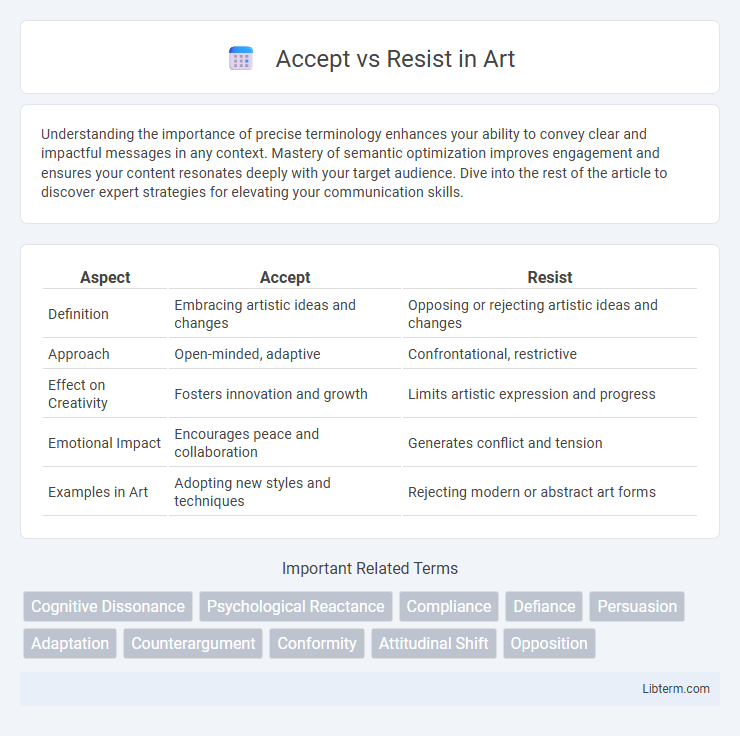Understanding the importance of precise terminology enhances your ability to convey clear and impactful messages in any context. Mastery of semantic optimization improves engagement and ensures your content resonates deeply with your target audience. Dive into the rest of the article to discover expert strategies for elevating your communication skills.
Table of Comparison
| Aspect | Accept | Resist |
|---|---|---|
| Definition | Embracing artistic ideas and changes | Opposing or rejecting artistic ideas and changes |
| Approach | Open-minded, adaptive | Confrontational, restrictive |
| Effect on Creativity | Fosters innovation and growth | Limits artistic expression and progress |
| Emotional Impact | Encourages peace and collaboration | Generates conflict and tension |
| Examples in Art | Adopting new styles and techniques | Rejecting modern or abstract art forms |
Understanding Accept vs Resist
Understanding Accept vs Resist involves recognizing how individuals respond to change or stressors. Acceptance entails embracing reality and adapting positively, while resistance triggers conflict and hinders progress. This cognitive approach affects emotional resilience and decision-making effectiveness in personal and professional contexts.
Psychological Foundations of Acceptance and Resistance
Psychological foundations of acceptance involve cognitive and emotional processes that enable individuals to acknowledge and adapt to internal or external experiences without unnecessary judgment or avoidance. Resistance, conversely, stems from defense mechanisms aimed at denying, suppressing, or fighting against uncomfortable thoughts, feelings, or realities. Neuroscientific studies highlight that acceptance engages prefrontal cortex regions associated with cognitive control, while resistance activates the amygdala, which processes fear and threat responses.
The Power of Letting Go: Benefits of Acceptance
The power of letting go through acceptance transforms emotional resilience by reducing stress and promoting mental clarity. Neuroscientific studies show that acceptance activates the prefrontal cortex, enhancing emotional regulation and decreasing amygdala-driven anxiety responses. Embracing acceptance over resistance fosters psychological well-being, enabling individuals to navigate adversity with greater ease and sustained inner peace.
Consequences of Resistance in Personal Growth
Resisting change often leads to prolonged stress and missed opportunities for personal growth, as individuals cling to familiar patterns despite evolving circumstances. Accepting new challenges fosters resilience, adaptability, and greater self-awareness, all crucial for long-term development. The consequences of resistance manifest in stagnation, limiting emotional intelligence and hindering progress toward achieving one's full potential.
Accept vs Resist in Decision-Making
Accept vs resist in decision-making involves evaluating options based on risk tolerance, potential benefits, and personal values. Accepting a choice means embracing uncertainty and consequences, while resisting often reflects caution and desire for control. This dynamic influences outcomes by shaping commitment levels and adaptability in complex situations.
Emotional Impacts: Acceptance Versus Resistance
Acceptance fosters emotional resilience by promoting inner peace, reducing stress, and encouraging self-compassion, which enhances mental well-being. Resistance often triggers heightened anxiety, frustration, and emotional exhaustion due to persistent conflict with reality and unmet expectations. Embracing acceptance leads to healthier coping mechanisms and improved overall emotional balance compared to the turmoil associated with resistance.
Accepting Change: Strategies and Tips
Accepting change involves cultivating adaptability by embracing new experiences and perspectives. Effective strategies include practicing mindfulness to stay present, reframing negative thoughts into growth opportunities, and setting small, achievable goals that ease the transition. Consistent use of these techniques enhances resilience and promotes positive adjustment during periods of change.
When to Resist: Standing Up for Your Values
Resisting is essential when faced with situations that conflict with your core values and ethical principles, helping maintain personal integrity and moral clarity. Standing up against injustice, discrimination, or unethical practices reinforces your commitment to fairness and human dignity. Choosing to resist empowers you to create positive change and uphold the standards important to your identity and community.
Balancing Acceptance and Resistance in Relationships
Balancing acceptance and resistance in relationships involves recognizing when to embrace differences and when to set healthy boundaries. Acceptance fosters empathy and trust, allowing partners to feel valued for their authentic selves, while resistance protects individual needs and prevents codependency. Effective relationships thrive on this dynamic interplay, ensuring mutual respect and emotional growth.
Choosing Wisely: Navigating Accept and Resist in Life
Choosing wisely between acceptance and resistance shapes emotional resilience and personal growth. Accepting reality fosters peace by acknowledging uncontrollable factors, while resistance fuels change when values or goals are compromised. Balancing acceptance with purposeful resistance enables adaptive responses to life's challenges and opportunities.
Accept Infographic

 libterm.com
libterm.com